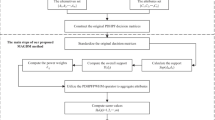Abstract
With the proposal of a green shipping development strategy, the sustainable development of container ships has become a hot issue for shipping companies. In this study, an extended TODIM method is offered within interval-valued Pythagorean hesitant fuzzy sets and is used to select the ideal container ship. The Pythagorean hesitant fuzzy sets presented in the form of intervals can retain experts’ uncertainty and hesitance to the greatest extent and reflect experts’ approval and disapproval of container ships. The cosine similarity measure among interval-valued Pythagorean hesitant fuzzy sets is defined for measuring the similarity of any two alternatives. Finally, the evaluation of container ships in terms of the shipping economy, resource, and environmental factors is reported to support the reliability and validity of the designed evaluation method.
Access this chapter
Tax calculation will be finalised at checkout
Purchases are for personal use only
Similar content being viewed by others
References
Pike, K., Butt, N., Johnsn, D.: Global sustainable shipping initiatives: Audit and overview. http://awsassets.Panda.Org/downloads/sustainable_shipping_ initiatives_report_1.pdf. Accessed 16 Mar 2016
Lirn, T., Lin, H., Shang, K.: Green shipping management capability and firm performance in the container shipping industry. Marit. Policy Manag. 41(2), 159–175 (2014)
Zadeh, L.A.: Fuzzy sets. Inf. Control. 8(3), 338–353 (1965)
Atanassov, K.T.: Intuitionistic fuzzy sets. Fuzzy Sets Syst. 20(1), 87–96 (1986)
Yager, R.R.: Pythagorean fuzzy subsets. In: Proceeding of the Joint IFSA World Congress and NAFIPS Annual Meeting, Edmonton, Canada, pp. 57–61 (2013)
Yager, R.R., Abbasov, A.M.: Pythagorean membership grades, complex numbers, and decision making. Int. J. Intell. Syst. 28(5), 436–452 (2013)
Liu, W.F., He, X.: Pythagorean hesitant fuzzy set. Fuzzy Syst. Math. 30(4), 107–115 (2016)
Zhang, M.Y., Zheng, T.T., Zheng, W.R.: Interval-valued Pythagorean hesitant fuzzy set and its application to multi-attribute group decision making. Complexity 2020(12), 1–26 (2020)
Zavadskas, E.K., Mardani, A., Turskis, Z.: Development of TOPSIS method to solve complicated decision-making problems-an overview on developments from 2000 to 2015. Int. J. Inf. Technol. Decis. Making 15(3), 645–682 (2016)
Lei, F., Wei, G., Gao, H.: TOPSIS method for developing supplier selection with probabilistic linguistic information. Int. J. Fuzzy Syst. 22(3), 749–759 (2020)
Akram, M., Adeel, A.: TOPSIS approach for MAGDM based on interval-valued hesitant fuzzy N-soft environment. Int. J. Fuzzy Syst. 21(3), 993–1009 (2019)
Kumar, A., Aswin, A., Gupta, H.: Evaluating green performance of the airports using hybrid BWM and VIKOR methodology. Tour. Manag. 76(2), 103941.1–103941.16 (2020)
Akram, M., Ilyas, F., Garg, H.: Multi-criteria group decision making based on ELECTRE I method in Pythagorean fuzzy information. Soft Comput. 24(5), 3425–3453 (2020)
Hashemi, S.S., Hajiagha, S.H.R., Zavadskas, E.K.: Multicriteria group decision making with ELECTRE III method based on interval-valued intuitionistic fuzzy information. Appl. Math. Modell. 40(2), 1554–1564 (2016)
Makan, A., Fadili, A.: Sustainability assessment of large-scale composting technologies using PROMETHEE method. J. Clean. Prod. 261, 121244 (2020)
Gomes, L., Lima, M.: TODIM: basics and application to multicriteria ranking of projects with environmental impacts. Found. Comput. Decis. Sci. 16(4), 113–127 (1992)
Gomes, L., Lima, M.: From modeling individual preferences to multicriteria ranking of discrete alternatives: a look at prospect theory and the additive difference model. Found. Comput. Decis. Sci. 17(3), 171–184 (1992)
Mirnezami, S.A., Mousavi, S.M., Mohagheghi, V.: An innovative interval type-2 fuzzy approach for multi-scenario multi-project cash flow evaluation considering TODIM and critical chain with an application to energy sector. Neural Comput. Appl. (2020). https://doi.org/10.1007/s00521-020-05095-z
Zhang, Y., Yang, W.: Hesitation Pythagorean fuzzy TODIM approach. Fuzzy Syst. Math. 34(2), 85–92 (2020)
Dawood, H.: Theories of interval arithmetic: Mathematical foundations and applications. LAP Lambert Academic Publishing, Saarbrücken, Germany (2011)
Zindani, D., Maity, S.R., Bhowmik, S.: A material selection approach using the TODIM (TOmada de Decisao Interativa Multicriterio) method and its analysis. Int. J. Mater. Res. 108(5), 345–354 (2017)
Divya, Z., Saikat, R.M., Sumit, B.: Complex interval-valued intuitionistic fuzzy TODIM approach and its application to group decision making. J. Ambient Intell. Human. Comput. (2020). https://doi.org/10.1007/s12652-020-02308-0
Geng, Y., Liu, P., Teng, F.: Pythagorean fuzzy uncertain linguistic TODIM method and their application to multiple criteria group decision making. J. Intell. Fuzzy Syst. 33(6), 3383–3395 (2017)
Luiz, F.A., Luís, A.D.: An application of the TODIM method to the multicriteria rental evaluation of residential properties. Eur. J. Oper. Res. 193(1), 204–211 (2009)
Barzilai, J.: Deriving weights from pairwise comparison matrices. J. Oper. Res. Soc. 48(12), 1226–1232 (1997)
Acknowledgements
This work was supported by the Science and technology project of the science and technology department of Henan province (No. 212102210149).
Author information
Authors and Affiliations
Corresponding author
Editor information
Editors and Affiliations
Rights and permissions
Copyright information
© 2021 Springer Nature Singapore Pte Ltd.
About this paper
Cite this paper
Liu, X., Bao, J., Meng, Y., Wang, L. (2021). An Extended TODIM Method Based on Interval-Valued Pythagorean Hesitant Fuzzy Sets and Its Utilization in Green Shipping. In: Zhang, H., Yang, Z., Zhang, Z., Wu, Z., Hao, T. (eds) Neural Computing for Advanced Applications. NCAA 2021. Communications in Computer and Information Science, vol 1449. Springer, Singapore. https://doi.org/10.1007/978-981-16-5188-5_37
Download citation
DOI: https://doi.org/10.1007/978-981-16-5188-5_37
Published:
Publisher Name: Springer, Singapore
Print ISBN: 978-981-16-5187-8
Online ISBN: 978-981-16-5188-5
eBook Packages: Computer ScienceComputer Science (R0)




